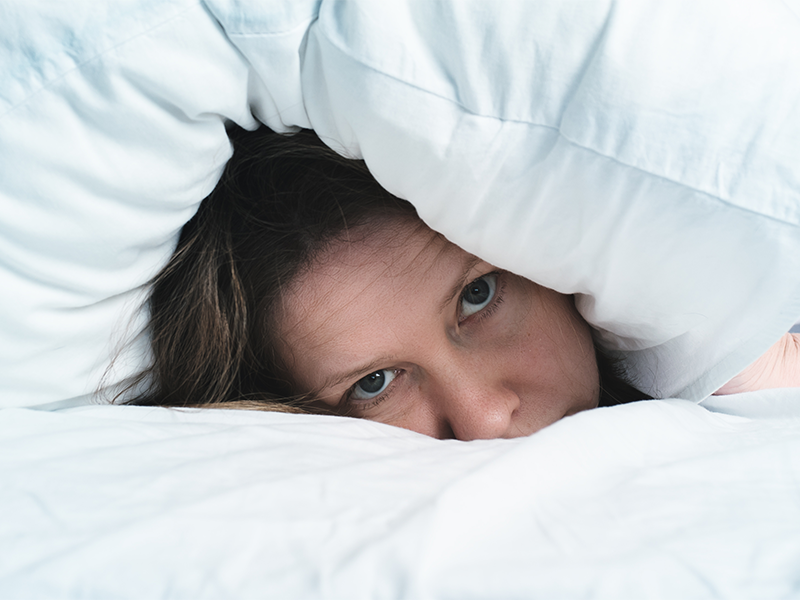Things you’ll learn in this blog… |
One day, you wake up, check the scales, and it dawns on you - you’ve gained weight.
This can be incredibly frustrating if you’ve always found it pretty easy to manage your weight - and now you’re struggling.
And the truth is…it is more challenging to lose weight post-40. It’s hard to accept, but as we age, it’s easier to pile on the pounds and a whole lot harder to shift the weight.
While there is no magic switch to reverse the aging process, there could be unique reasons behind your weight gain as a woman – with hormone fluctuations being one of them.
In this guide, you can discover the link between hormones and weight gain after 40. It will help you understand what’s going on in your body and potentially connect the dots to realize that a hormone imbalance is causing your weight gain.
Therefore, you need to know the causes, symptoms, impacts and solutions.
Why do Women Gain Weight After 40?
Firstly, here’s a look at some of the main reasons women gain weight after 40.
Hormone Changes
Hormones and weight gain after 40 are prevalent and are something to consider throughout a woman's life, but especially later on. According to research, women aged between 45 and 55 gain (on average) gain around half a kilo per year and often, this is related to hormones.
The female sex hormone, estrogen can cause significant weight gain when it becomes imbalanced - whether it’s too high or low.
Female hormones can impact your weight depending on your stage of life. The three main steps are
- Perimenopause
- Menopause
- Post-menopause
Let’s examine these three stages more closely.
Perimenopause
Perimenopause begins several years before menopause. It’s the build-up stage where a woman slowly begins her transition to menopause, but her periods have yet to stop.
The age at which you start perimenopause varies, but it typically begins in your late 30s and 40s.
During the transition, it’s common for women to start experiencing changes to their hormones and bodies.
The main perimenopause symptoms are
- Hormonal changes
- Weight gain
- Irregular periods
- Mood changes
- Sleep problems
- Loss of sex drive
- Decreased fertility

The hormonal changes that often occur during perimenopause directly result from declining estrogen levels (the female sex hormone). The ovaries in the female body create estrogen, which affects a wide range of factors, from the heart and blood vessels to the bones and hair.
Estrogen is incredibly important, which is why adverse side effects occur when it slowly declines in the perimenopause stage. During perimenopause, women typically gain around 2-5 pounds, although in certain cases, you may be fortunate and not experience any weight gain.
Alternatively, if a woman is already struggling with her weight when perimenopause begins, she will likely gain more weight as her estrogen levels begin to decline.
Menopause
Menopause is when your periods stop entirely due to reduced estrogen and hormone levels.
Typically, this occurs between the ages of 45 and 55 – but it can happen sooner. Once you haven’t had a period for over 12 months, then you have officially reached the menopause stage.
The ovaries stop producing eggs at this stage, and you can no longer get pregnant.
It is, however, still possible to get pregnant during perimenopause, although your chances are significantly less.
The main menopause symptoms are:
- Hormonal changes
- Weight gain
- Anxiety
- Mood swings
- Sleep problems
- High blood sugar
- Muscle tissue loss
- Not feeling yourself
It’s also possible for women to lose muscle mass because of menopause, which can make them feel weaker than they were previously.
For example, if a woman regularly used to do strength training before starting her menopause, she will naturally find it much harder to do after.
The symptoms are similar to the perimenopause stage, although they’re usually more significant and noticeable during menopause due to decreased estrogen production.
Women produce estradiol in their ovaries (estradiol is the primary form of estrogen).
During menopause, women then stop making estradiol and start to produce estrone instead, which is produced primarily in fatty tissues. This is why it’s common for women to gain weight during menopause.
Related content: How to lose weight post-menopause?
Post-Menopause
Post-menopause can begin at any time in your 40s and 50s. Most of the symptoms you may have been experiencing during menopause will significantly reduce or stop entirely.
For example, if you’ve been suffering from hot flashes or increased anxiety, these symptoms are likely to disappear, which is good news. In some cases, symptoms do continue for a little longer than usual. The main post-menopause symptoms are:
- Weight gain
- Vaginal dryness
- Depression
- Sleep problems
- Dry skin
- High blood sugar
- Hair loss
It’s also important to note that there can be an increased risk of other health-related conditions during post-menopause, such as heart disease and weaker bones.
Slowing Metabolism
Another significant reason women struggle with their weight after 40 is due to their metabolism slowing down. This phenomenon can happen to anyone, from stay-at-home mothers to women who work full-time jobs.

When your metabolism starts to slow down, it can be worrying at first, making you more susceptible to gaining weight because you’re burning fewer calories than before.
Usually, when a woman is in her 20s and 30s, her metabolism is higher, so it’s easier to keep her weight under control. However, once her metabolism slows down, it becomes much harder to shed fat and burn calories.
Aside from weight gain, other slow metabolism symptoms in women include:
- Consistent fatigue
- Headaches
- Depression
- Thinner hair
- Dry skin
Your metabolism can start to drop in your late 20s, but it’s more common to experience this between ages 40 and 60.
Unhealthy Eating
It may be that your diet has become less nutritious as you have grown older, which can have a seismic effect on your weight.
Typically, this will involve eating more sugary and fried foods, but factors such as increased alcohol intake can also play a key role.
There are many reasons why women change their diets and stop eating healthy foods after 40. It’s often a result of having children and balancing a busy lifestyle, alongside raising children and working - which can cause a healthy diet to be neglected.
Lack of Exercise
Exercise is essential to maintain a healthy weight – especially after you’ve hit 40.
It’s usually a combination of a lack of time and other commitments that lead women to stop exercising a much. Plus as we age it becomes harder to recover from physical exercise as you get older, so many women choose not to exercise leading to increased body fat, low muscle mass, and other problems.
However, not only does this make burning calories harder, it also leads to muscle mass reduction. An increased muscle mass allows you to burn more calories at rest, so has a knock-on effect of helping you maintain or lose weight.
High Levels of Stress
Women can experience high levels of stress at any age. However, it’s ubiquitous to experience higher stress levels in your 40s and beyond, which usually aligns with reduced estrogen and hormonal fluctuations.
When you’re stressed, this can lead to cortisol (the primary stress hormone) stimulating fat and carbohydrate metabolism. In turn, you may experience an increased appetite, particularly for sweet, fatty, and salty foods, which can lead to weight gain.

High-stress levels are also linked to decreased muscle mass and muscle strength because stress hormones cause the catabolism of muscle proteins. Essentially, this makes building muscle much harder, reducing muscle tissue.
Fortunately, stress is a variable that is relatively easy to control and eliminate when compared to other variables. For example, some women find that meditation, exercise, mindfulness, and other strategies are great for reducing their stress over the long term.
Related content: Can stress make you lose weight?
How to Lose Weight After 40
If you’re struggling with hormonal weight gain after you’ve turned 40, then don't worry. You can take many approaches to lose weight and keep it under control.
Although losing weight when you’re over 40 is much harder to achieve, it’s still possible. You should see positive results within weeks or months if you work hard, have a clear plan, and remain consistent.
Here are many of the most effective methods to try:
Follow a Healthy Diet
A healthy diet is crucial to losing weight and reducing body fat. You'll find it impossible to lose weight if you consistently eat processed foods, sugary snacks, and everything else in between.
Plus, your overall health will take a hit, too – which could cause broader issues.
So, what are the keys to a healthy diet?
The essentials are:
- Eat lots of fruits and vegetables
- Reduce your intake of saturated fats and sugars
- Include high-fiber carbohydrates
- Eat plenty of fish
- Stay hydrated
- Never skip breakfast
- Focus on food variety
Suppose you’re a busy stay-at-home mother or working professional with very little time on your hands. In that case, you might find it helpful to speak to a dietitian or personal trainer that can help personalize a healthy diet for your specific needs.
Exercise Regularly
Exercise is a brilliant way to lose weight. It can also encourage healthy digestion and muscle gain and improve mental well-being.
Of course, every woman is different regarding how much exercise they need to do to see results.
The general guideline for beginners is to do around 30 minutes of moderate physical activity daily. This exercise could be anything - from an uphill walk to jogging on the treadmill in a gym.

As you become fitter, you can make your exercise routine more grueling - such as by completing push-ups, sit-ups, and burpees.
If you decide to join a gym, consult one of the personal trainers and do a class with them so that they can talk you through individual exercises, routines (such as strength training) and how to use the gym equipment.
You can also ask personal trainers as many questions as you like, such as how to get lean muscle and shed fat. Working with a personal trainer will make regular exercise far less intimidating and make losing weight easier.
Stay active
Regardless of exercise and general strength training, it’s good to move as much as possible to prevent weight gain and lose body fat.
Try to only sit for a short period, especially if you have an office job or work from home. You can even set ‘stand’ reminders on your smartphone or smartwatch that tell you to stand up and walk around when you’ve been sitting for too long.
If you want to create a more active lifestyle, then going for walks and doing yoga are great options. Yoga, for instance, is excellent for losing weight and boosting your overall flexibility.
Related content: Walking for weight loss: how to lose weight by increasing your steps
Take Supplements
Finally, hormone supplements are another natural weight loss aid women over 40 can use to lose weight.
It’s possible to buy over-the-counter weight loss supplements across various stores and online retailers. Supplements vary and it’s recommended you speak to a health professional to decide what is required, but they can help support healthy bodily function, which in turn will allow you to lose weight.
If you are struggling an effective weight loss supplement such as PhenQ, which suppresses your appetite after eating might help you. Over the long run, this ensures you don’t consume too much food. PhenQ also helps women by boosting their body’s metabolic and thermogenic rates, which helps burn fat.
How to lose weight post-40
It can be a massive confidence dent to pile on weight in your 40s, especially if you have always been relatively healthy and lean. The truth is it will be more difficult, but certainly not impossible to lose weight in your 40s, 50s, 60s and beyond.
You will likely see positive weight loss results and improved body composition by fixing your diet, getting regular exercise, and taking supplements.
Putting the advice mentioned above into practice can help combat the effects caused by menopause and various other weight gain factors.
If you’d like a little support a supplement such as PhenQ can help you suppress appetite and boost metabolism - giving you the helping hand you need to lose those difficult-to-shift pounds.




